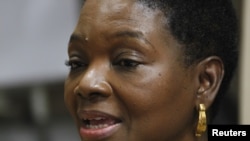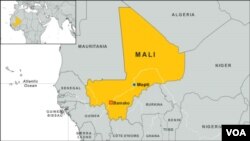The United Nations' humanitarian chief is calling for more aid to Mali, where a food crisis and conflict have impacted more than four million people.
Valerie Amos spoke to reporters in Mali's capital, Bamako, late Thursday at the end of a three-day trip to the West African country.
She said almost 150,000 children in Mali have been treated for acute malnutrition this year, mostly in the south.
Amos said the U.N. has received less than half of the $213 million it is seeking to meet emergency needs in Mali and to break a long-term cycle of drought and hunger.
She also expressed hope for a return to peace and stability in northern Mali, where more than 400,000 have fled their homes. Islamist militants seized control of the region in April, after a coup in Bamako, and are trying to enforce a harsh form of Islamic law.
Amos visited a camp for displaced Malians in the city of Mopti. She said people there told her "they are the lucky ones." She said there are many places in the north that aid agencies cannot reach because of ongoing danger.
In Mopti, Amos saw relief supplies being sent by river barges to towns further north, including Timbuktu.
The U.S.- funded Famine Early Warning Systems Network has predicted northern Mali's food situation will improve later this year because of promising harvests and increasing international aid.
It said last week that markets in the region are "adequately supplied" but that prices are high and household incomes are lower than usual because of the conflict.
Valerie Amos spoke to reporters in Mali's capital, Bamako, late Thursday at the end of a three-day trip to the West African country.
She said almost 150,000 children in Mali have been treated for acute malnutrition this year, mostly in the south.
Amos said the U.N. has received less than half of the $213 million it is seeking to meet emergency needs in Mali and to break a long-term cycle of drought and hunger.
She also expressed hope for a return to peace and stability in northern Mali, where more than 400,000 have fled their homes. Islamist militants seized control of the region in April, after a coup in Bamako, and are trying to enforce a harsh form of Islamic law.
Amos visited a camp for displaced Malians in the city of Mopti. She said people there told her "they are the lucky ones." She said there are many places in the north that aid agencies cannot reach because of ongoing danger.
In Mopti, Amos saw relief supplies being sent by river barges to towns further north, including Timbuktu.
The U.S.- funded Famine Early Warning Systems Network has predicted northern Mali's food situation will improve later this year because of promising harvests and increasing international aid.
It said last week that markets in the region are "adequately supplied" but that prices are high and household incomes are lower than usual because of the conflict.







